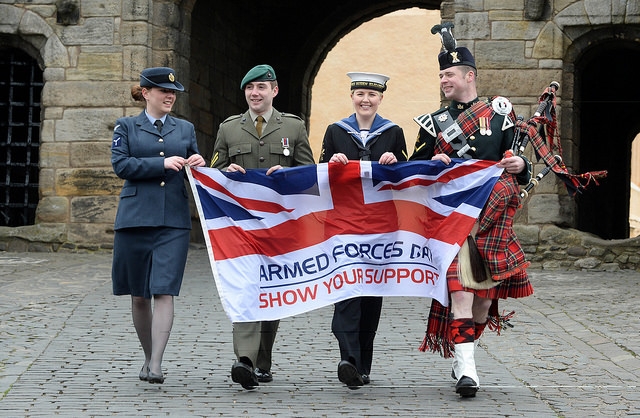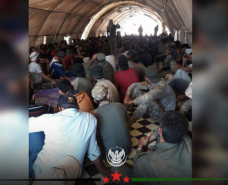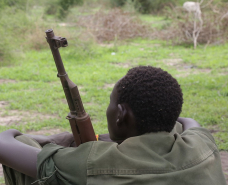UK: Militarising Childhood

By Dr. Victoria M. Basham
Since the late 2000s, successive British governments have put considerable resources into promoting greater recognition and support for the UK Armed Forces. The targeting of children has been integral to this. From the Ministry of Defence’s (MoD) recommendation that its ‘Armed Forces Days’ take place on Saturdays so that school children can more easily attend, to military provision of activities for classrooms, enhancing positive associations with the military, specifically among children, has been an aim from the outset.
When the Liberal Democrat and Conservative Coalition Government came to power in 2010, the targeting of children for involvement in military activities accelerated. This ongoing agenda entailed mainstreaming something called ‘the military ethos’ into British children’s lives. Broadly, this is the idea that certain values and qualities are instilled in military personnel and veterans by military service that have a wider social value. The military, according to this logic, is characterised as a disciplined organisation, where values such as loyalty, hard-work, courage, self-sacrifice and commitment are routinely promoted. These are values that British children would, suggest the government, benefit from greater exposure to.
In order to bring the military ethos into children’s lives, the Government has been ploughing millions of pounds into creating new cadet units in state-funded schools, offering grants, again totalling millions, to veteran-led groups offering alternative provision for underperforming pupils and fast-tracking selected veterans without degrees through teacher training with salaries or government grants via its ‘Troops to Teachers’ (T2T) scheme. It also continues to pilot ways to link the National Citizen Service more directly to military training.
The idea that the lives and life chances of British children will be enhanced through greater exposure to the ‘military ethos’, warrants further consideration however. One underlying assumption is that military personnel and veterans not only embody positive social values, but that their values are higher than those of members of wider society. Yet military personnel suffer greater rates of post-traumatic stress disorder (PTSD) and of drug and alcohol abuse than their civilian counterparts. Veterans commit more acts of interpersonal violence and have higher rates of violent criminality. All this suggests that military training and socialisation can also do a great deals of harm to individuals and communities.
Moreover, many non-graduates could potentially be excellent teachers, but it is only non-graduates who have had a military career who are being fast-tracked through teacher training. All manner of people in British society believe in helping children to develop values like hard work, loyalty, courage and commitment, including, of course, teachers! However, it is only veterans, military personnel and military organisations that are being heralded as a solution to society’s supposed ills and who are attracting significant levels of government funding.
The political desire to build popular support for the military ought to be more closely examined in its wider context therefore. One aspect of this is global recession. According to the Royal British Legion, unemployment among 18–49 year old veterans is often around twice the national average. The launch of Troops to Teachers coincided with such unemployment among veterans plus military redundancies, both of which affect troops who served in Afghanistan. The original Troops to Teachers programme originated in the US, and was essentially set up by Clinton to provide veterans of the first Gulf War with jobs. Likewise, Troops to Teachers UK serves an important political function for a Government under pressure to be seen to be doing something for veterans.
Another potentially important reason why children are the prime target of military ethos initiatives is the unrelenting need to fill the ranks. Plans to restructure the military by 2020 involve redundancies for regular personnel and a greater reliance on reservists, including volunteers who primarily work in civilian jobs. The MoD’s Youth Engagement strategy is not only concerned with promoting support for the armed forces among young people but with recruiting them. It is estimated that the armed forces make around 11,000 visits to secondary schools and colleges each year and in 2015 a document released under a Freedom of Information request made it clear that recruitment was one of the key ‘lines of effort’ identified by the Ministry of Defence for achieving its future aims for the cadet forces. Normalising the military among children and young adults, including through promoting their participation in military activities, may be a good way to recruit the regulars and reservists of the future.
Looking more closely at who is being most targeted by military ethos initiatives also illuminates some troubling links between them and recruitment activities. Troops to Teachers and alternative provision schemes were described by former Education Minister Michael Gove and other military ethos supporters as a means of providing young people ‘from some of the most disadvantaged backgrounds’ with ‘discipline, self-respect and a sense of purpose’. Some evaluations of these schemes suggest that veteran-led alternative provision and cadet membership can have a positive impact on attendance and behaviour in schools. However, children who are selected to participate in alternative provision typically drop formal qualifications like General Certificate of Secondary Education (GCSE) to focus on an ‘alternative curriculum’ which often involves camping out overnight, walking 15 miles in two days, first aid training, and so on. These activities promote skill sets that are highly compatible with military service and enlisting may become a more attractive option. Moreover, if children are dropping formal qualifications in favour of developing these skills their entry into the armed forces would largely be at the lowest, most hazardous levels of the military, where less or no qualifications are required. The military’s two-tier entry system, where those without qualifications enter the ‘ranks’ and those with qualifications enter as officer cadets, not only sustains pre-military socio-economic inequalities but entrenches them.
The protracted idea of a society detached and distant from its military is something that many scholars, commentators and members of the public, as well as politicians, propagate. Recent governments have not only suggested that Britain has an unhealthy ‘civil-military gap’ but that closing it warrants new policies funded by taxpayers. This obscures a great deal, however, not least that the UK is a warfare state. The UK maintains one of the world’s largest military budgets, its culture routinely venerates the military– football fans chanting ‘two world wars and one world cup’ springs to mind – and it remains the only country in Europe to recruit 16 year olds, something which no other member of NATO or no other permanent member of the UN Security Council does either. Training provided to children by veterans risks socialising them in conformity and obedience to authority. This is unlikely to foster the questioning young minds that are so vital to ensuring democratic oversight of the future role and use of our armed forces and of future British foreign policy. Military ethos initiatives, especially those supposedly aimed at bettering the lives of disadvantaged children will also make it harder for teachers, parents, children and indeed, anyone, to question the military and its activities without risking being labelled as unpatriotic. As the military becomes more integral to society, as soldiers become teachers, and soldiering becomes an idealised career for more young people, it is hardly trivial to wonder if military violence and war might just also become that little bit more common-sensical too.
Dr. Victoria M. Basham is a senior lecturer in International Relations at the School of Law and Politics, Cardiff University. He has various publications on how gender, race, ethnicity, sexuality and social class shape the prioritisation, use and perpetration of military force, especially in liberal democratic societies. In 2015, she became the Editor-in-Chief of the journal Critical Military Studies (Taylor & Francis) which she co-founded.
Photo: Stirling Council via Flickr
Countering Military Recruitment

WRI's new booklet, Countering Military Recruitment: Learning the lessons of counter-recruitment campaigns internationally, is out now. The booklet includes examples of campaigning against youth militarisation across different countries with the contribution of grassroot activists.
You can order a paperback version here.








